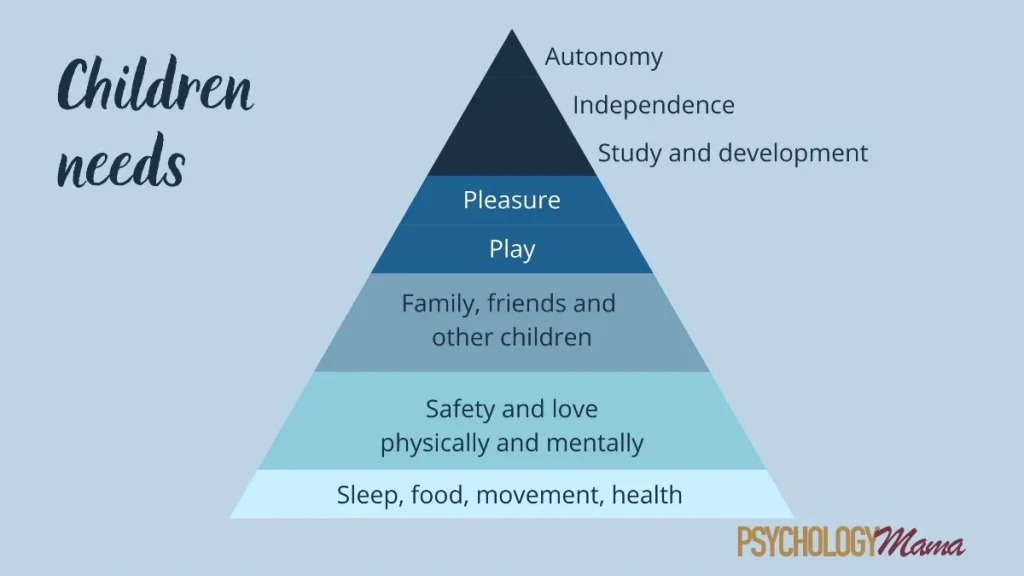This is a question many parents ask themselves. After all, we want to support our children, but at the same time, we worry that we’re overdoing it. I have summarized the most important information for you here, highlighting the advantages and disadvantages.
Table of Contents
Are we too strict as parents?
When we think of strict parents, most of us think of authoritarian parenting. So that parenting style in which the power and control lie with us parents. However, control and rules are also present and beneficial in other parenting styles, such as the authoritative style. Here the control is present but adapted to the age of the child.
This means that our children have the freedom to let off steam independently in the areas that they already master and for which they are mature enough. I think that’s where most parents who think about themselves and question their upbringing fall into it. They raise authoritatively but worry about being too strict. These thoughts often come because we parents have overreacted in stressful situations, or because we compare ourselves to other parents.
In addition to the everyday stresses, we parents have to be able to set limits for our children, raise them lovingly and give them support. A balancing act that is not always easy and demands a lot from us. So, it’s quite natural that we sometimes make mistakes, become impatient, perhaps take the consequences too quickly and regret something afterward. However, all this does not automatically mean that we were too strict. Maybe just too hasty or just too stressed out.
I can reassure you, the basic needs of our children are, in addition to the physiological needs: safety, love, recognition, joy, development and independence, and autonomy.
The basic needs of our children
Needs cannot be met by single events, nor can they be unmet by single events. It’s all about the trend. Therefore, individual mistakes, although annoying for ourselves and of course as well for the current state of our children, are less influential overall.
If you now ask yourself whether you are generally too strict, this has an impact on several basic needs, but mainly on autonomy. Of course, depending on their age, our children still need our help and support. It is therefore particularly important that you give your child the freedom that is appropriate for their age but above all for their abilities. And in this case, you are the expert.
All the information about your child comes together within you. This means that even if others of that age are already allowed to do this or that, it is up to you as a family to decide for yourself whether it is right for your child or not. Ideally, of course, really as a family, i.e. taking your child’s opinion into account.

Provide support to children
Many may ask themselves: how can I give my child support without being authoritarian or too strict? How can I ensure that my child does not slip away from me? I have summarized the most important cornerstones for you here.
Be aware
Setting limits and an authoritative parenting style is not a contradiction in terms!
Rules
Rules that our children can follow are significant. You keep our children safe by setting boundaries for our children. Our children can experiment and learn within these limits in a safe environment. Of course, our children will always test where these limits lie. This is perfectly normal and healthy behavior. Although often quite difficult for us parents. It is all the more important to show our children where these limits are and why they should not be crossed.
Of course, rules do not have to be rigid and followed blindly. It is advisable to adopt rules, depending on the age and abilities of your child, and to work out and define them together. The younger your child, the more specific and clear these rules should be.
Secure Bond
A secure parent-child bond is a basic requirement for our children to learn. You know that we are always here for you and that this is unconditional. This gives them the support to try things out and explore and discover new things. This applies to infancy as well as to adolescence.
We can strengthen this secure bond through closeness, love, and many beautiful shared experiences. Mutual respect, acceptance, and trust are inevitably the most important points here.
Engagement
Common activities and that we actively participate in the life of our children, as well as they should be actively included in our lives, is an often underestimated point to give children support. Many think this is the case anyway. However, the actual time that we spend together is very limited due to our everyday life.
Using this time sensibly and actively together is all the more important. Sharing ideas throughout the day is important, even for small children. On the one hand, ask what they experienced today and, on the other hand, tell them about our day. But also playing together, laughing, having fun, or simply doing the household chores together offers many opportunities to experience everyday life together.
Autonomy
The most important basic need is the experience and living of autonomy, i.e. freedom. Also with our children. Our children are not robots, and even the smallest child needs freedom in which they can discover and shape themselves and their environment as they wish.
However, I would like to point out again that this freedom must of course always be adapted to the age and individual abilities of your child.
Independence
Let your child take matters into their own hands. Of course, we want to protect our children and relieve them as much as possible. That’s not good for them at all. Unless, of course, it’s an actual threat.
It is much more effective to accompany our children through a challenge. Offer them help and support, but let them do it themselves. Otherwise, our children will not succeed. This means that they have not learned anything or only very little, and also have no sense of achievement. This sense of achievement drives our children to try things again and again, or to get involved in new things.
The absence of these experiences also gnaws at self-esteem and self-confidence over time. Of course, this should be avoided. We all want strong children. But we won’t be able to do that if we don’t let them gain experience.
Appreciation
Appreciation means appreciating each other and what the other does. In adult relationships, the topic comes up more often. However, it is also important when dealing with our children. It shows the sympathy and acceptance of our children and thus strengthens the bond.
Respect
Having respect for one another and accepting others go hand in hand. We parents tend to overlook our children at times. A no is not always a no for us. We do it anyway, even though our kids said no to it. ”We have to blow our noses!”. “No, I do not want to.” And yet, we come with the handkerchief because we can’t stand it. But also my favorite example. “Mom, I’m scared of….”. “No, you don’t need to be afraid”.
With such and similar sentences, we undermine our children. It’s disrespectful, even though we only want what’s best for them. Taking our children seriously here and respecting that is not always easy, and it is also not possible in actual dangerous situations. But it’s probably possible far more often than we do. We’re happy to omit the explanation because it’s easier.
I know that we parents don’t always manage to do this, but I want to give you some food for thought here. We demand respect from our children, so I think it’s appropriate to respect them too. Everyone has to find their way, of course.
This is about the child who lives in the environment of adults: a troublemaker who is looking for something for himself and finds nothing, who enters and is immediately turned away. His situation is similar to that of a man deprived of civil rights and the right to his environment: he is a marginalized being who can treat anyone without respect, abuse, and punishment, thanks to a right conferred by nature: the right of the adult.Maria Montessori
Honesty
Honesty towards our children is also essential in an age-appropriate way to give them security and support. The other side of the coin is lies and concealment. However, children often tolerate more truth than we adults think. Honesty shows respect and strengthens our bond and trust in us.
I have more for you here on the subject of how much truth our children can take.
Strict parents: pros and cons
Of course, it depends a lot on what you define as strict. I used the authoritarian parenting style for this list. So, a strong control, with little freedom and independence for the child. However, the mere introduction and enforcement of rules and limits are not included here. For the benefits of rules and limits, please see the paragraph under the rules heading.
| Advantages | Disadvantages |
|---|---|
| control over the child | child is not independent |
| Very well adjusted child | child is intimidated |
| Usually the easier way | Child may be prone to violence towards others |
| Child has low self-esteem | |
| Child has low self-esteem | |
| Child probably has problems at school | |
| Child may have few friends | |
| Child has no opportunity to discover his creativity | |
| Child often has many fears | |
| You have a strained parent-child relationship | |
| Insecure attachment | |
| Long-term negative consequences |
Late effects of authoritarian upbringing
An authoritarian parenting style has a forceful impact on self-esteem, both in the short term and in the long term. People who were brought up in an authoritarian way think badly of themselves, believe they can’t do anything, and aren’t worth anything. This is reflected in what people with low self-esteem say about themselves, but also in the fact that they have less confidence in themselves and therefore refrain from many actions. They tend not to set goals because they don’t believe in achieving them.
This also has a bad effect on performance at school, in further training, and later in work.
An authoritarian parenting style can also lead to having no or very few friends. Since authoritarian parents also intervene massively in the choice of friends. This leads to limited friendships, but also less experience in dealing with others. It is therefore possible that the social skills, i.e. the skills that we need to get along well with other people and to get to know them, were learned less well or awfully.
In the long term, of course, all of this also leads to mental stress and, under certain circumstances, to mental illnesses such as depression, excessive alcohol or drug consumption, or even worse.

